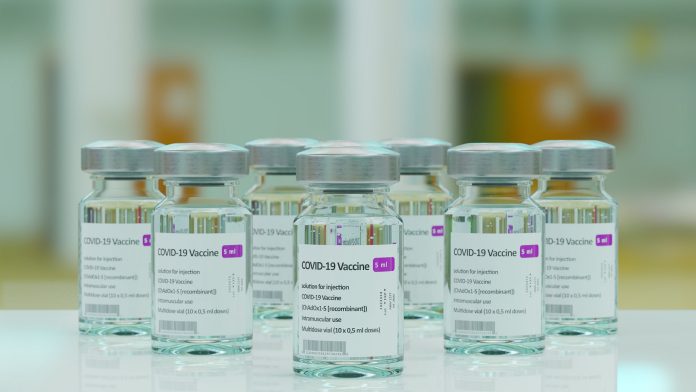Three adenoviruses used as vectors to produce COVID-19 vaccines, bind to platelet factor 4 (PF4), a protein implicated in the pathogenesis of clotting disorders.
Adenovirus based COVID-19 vaccines such as Oxford/AstraZeneca’s ChAdOx1 use the weakened and genetically modified version of common cold virus adenovirus (a DNA virus) as vector for expression of viral protein of novel coronavirus nCoV-2019 in the human body. The expressed viral protein in turn act as antigen for development of active immunity. The adenovirus used is replication incompetent meaning it cannot replicate in human body but as vector it provides an opportunity for translation of incorporated gene encoding Spike protein (S) of novel coronavirus1. Other vectors such as human adenovirus type 26 (HAdV-D26; used for Janssen COVID vaccine), and human adenovirus type 5 (HAdV-C5) have also been used to generate vaccines against SARS-CoV-2.
Oxford/AstraZeneca COVID-19 Vaccine (ChAdOx1 nCoV-2019) was found effective in clinical trials and received approval by the regulators in several countries (it received approval by MHRA in the UK on 30 December 2020). Unlike the other COVID-19 vaccine (mRNA vaccine) available around that time, this was thought to have relative advantage in terms of storage and logistics. Soon it became the staple vaccine in the fight against the pandemic worldwide and made significant contributions in protecting people worldwide against COVID-19.
However, a possible link between AstraZeneca’s COVID-19 vaccine and blood clot was suspected when about 37 cases of rare event of blood clots were reported (out of more than 17 million people vaccinated) in the EU and Britain. In light of this possible side effect, subsequently, Pfizer’s or Moderna’s mRNA Vaccines were recommended2 for use in those under 30. But how rare clotting disorders such as thrombocytopenia syndrome (TTS), a condition resembling heparin-induced thrombocytopenia (HIT) seen in people administered with AstraZeneca COVID-19 vaccine which uses the ChAdOx1 (chimpanzee adenovirus Y25) vector is caused and the underlying mechanism involved, remained unclear.
A recent study published in Science Advances by Alexander T. Baker et al. demonstrates that the three adenoviruses used as vectors to produce SARS-CoV-2 vaccines, bind to platelet factor 4 (PF4), a protein implicated in the pathogenesis of HIT as well as TTS.
Using a technique known as SPR (Surface Plasmon Resonance), it was shown that PF4 binds not only with pure vector preparations of these vectors, but also with vaccines derived from these vectors, with similar affinity. This interaction is due to the presence of strong electropositive surface potential in PF4 which helps in binding to the overall strong electronegative potential on the adenoviral vectors. In case of administration of the ChAdOx1 covid vaccine, the vaccine injected into the muscle may leak into the bloodstream, leading to formation of ChAdOx1/PF4 complex as described above. In rare cases, the body recognizes this complex as foreign virus and triggers formation of PF4 antibodies. The release of PF4 antibodies further leads to aggregation of PF4, thereby forming blood clots, lead to further complications and in certain cases, death of the patient. This has so far resulted in 73 deaths out of the nearly 50 million vaccine doses of AstraZeneca vaccine that have been given in the UK.
The TTS effect seen is more prominent after the first dose of vaccine rather than the second dose, suggesting that the anti-P4 antibodies may not be long lasting. The ChAdOx-1/PF4 complex is inhibited by the presence of heparin which plays a key role in HIT. Heparin binds to multiple copies of the P4 protein and forms aggregates with anti-P4 antibodies that stimulate platelet activation and ultimately leading to blood clots.
These rare life-threatening events suggest that there is a need to engineer carrier viruses in such a manner, so as to avoid any interactions with cellular proteins that can lead to SARs (Severe Adverse Reactions), thereby leading to death of the patient. Furthermore, one can look at alternative strategies to design vaccines based on protein sub-units rather than DNA.
***
Sources:
- Oxford/AstraZeneca COVID-19 Vaccine (ChAdOx1 nCoV-2019) Found Effective and Approved. Scientific European. Published 30 December 2020. Available at http://scientificeuropean.co.uk/covid-19/oxford-astrazeneca-covid-19-vaccine-chadox1-ncov-2019-found-effective-and-approved/
- Soni R. 2021. Possible Link Between AstraZeneca’s COVID-19 Vaccine and Blood Clots: Under 30s to be given Pfizer’s or Moderna’s mRNA Vaccine. Scientific European. Published 7 April 2021. Available at http://scientificeuropean.co.uk/covid-19/possible-link-between-astrazenecas-covid-19-vaccine-and-blood-clots-under-30s-to-be-given-pfizers-or-modernas-mrna-vaccine/
- Baker AT, et al 2021. ChAdOx1 interacts with CAR and PF4 with implications for thrombosis with thrombocytopenia syndrome. Science Advances. Vol 7, Issue 49. Published 1 Dec 2021. DOI: https//doi.org/10.1126/sciadv.abl8213
***






































